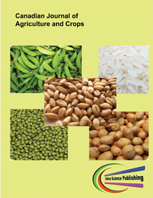Measurement of Sequestered Standing Carbon Stock in Major Agroforestry Tree Species
DOI:
https://doi.org/10.20448/803.5.2.153.159Keywords:
Carbon sequestration, Agroforestry tree species, Biomass.Abstract
In the present investigation, the aboveground and belowground carbon sequestration potential of agroforestry tree species from seven sectors of Bangabandhu Sheikh Mujibur Rahman Agricultural University (BSMRAU) campus was measured as a proxy of carbon fixation of agroforestry trees in Bangladesh. This campus occupies the area of 75.55 ha. Carbon emission has been increasing day by day due to anthropogenic activities and contributing to global climate change. Biomass production in different forms, i.e., aboveground biomass (AGB), belowground biomass (BGB), total biomass (TB), plays an essential role in carbon sequestration in trees. We estimated these biomasses by the nondestructive method to calculate the aboveground carbon (AGC), belowground carbon (BGC), total carbon (TC), and total CO2 of the study area. We found that the standing aboveground biomass and belowground biomass of agroforestry trees were 29.97 tha-1 and 7.79 tha-1 respectively, while the total standing biomass of agroforestry trees in 75.55 ha area was 37.76 tha-1. In the case of carbon, we observed that the total carbon sequestration and total carbon dioxide intake of agroforestry trees were 18.88 tha-1 and 69.29 tons CO2, respectively, in the study area. The highest carbon dioxide sequestration was observed in sector 6 (25%), and the lowest was observed in sector 3 (5%). The findings of carbon sequestration obtained from this study will be helpful for policymakers to take necessary steps against the adverse effect of global warming through carbon emission.


